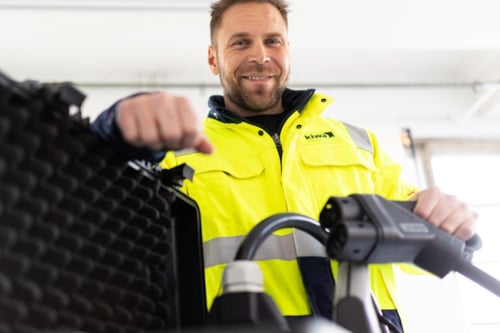Inspection of electric charging stations

The market for calibration services is set for continuous growth, fueled by rapid technological advancements and a rising need for precise and accurate instruments. As part of our comprehensive service portfolio, Kiwa provides reliable and accurate calibration services to ensure the precision and reliability of measurement instruments and equipment. It is important for companies to stay up to date with regulatory changes, technological advancements, and industry trends to maintain a competitive edge. Our calibration services are designed to assist businesses in maintaining the highest level of measurement accuracy, enabling you to operate efficiently and confidently in their respective fields. No matter in which sector you are active in.
In today's fast-paced and highly competitive world, precision and reliability are paramount. Whether it's manufacturing, aerospace, healthcare, or any other industry, accurate measurements play a vital role in ensuring quality, compliance, and operational excellence. That's where calibration becomes the key to unlocking accuracy.
We understand the criticality of precise measurements and the impact they have on your business. That is why we provide calibration services that enable you to unlock the full potential of your measurement instruments and equipment, ensuring consistent and reliable results. With our expert team of calibration technicians and cutting-edge facilities, we offer a comprehensive range of calibration services tailored to meet the unique needs of diverse industries. Whether you require calibration for electrical, mechanical, temperature, pressure, or dimensional measurements, we have the expertise and capabilities to deliver precise and dependable results.
Having a regular calibration program in place offers several benefits, including:

The process of calibration involves comparing the measurements of a device or instrument to a known reference or standard of higher accuracy. It's important to note that the specific steps and procedures involved in calibration can vary depending on the type of instrument or equipment being calibrated, the industry requirements, and the calibration laboratory's practices. Calibration is typically performed at regular intervals to ensure ongoing accuracy and reliability of the instrument's measurements. Here's a general overview of how the calibration process works.





Calibration is an essential process that verifies and adjusts the accuracy of measurement instruments, ensuring their performance meets the required standards and regulations. Kiwa's calibration services are designed to assist businesses in maintaining the highest level of measurement accuracy, enabling them to operate efficiently and confidently in their respective fields.
Kiwa offers calibration services for a wide range of instruments and equipment across various industries. Some of the common types of instruments that Kiwa can calibrate include:
This is not an exhaustive list, and Kiwa's calibration services extend beyond these examples. The specific instruments and equipment that Kiwa can calibrate may vary depending on their capabilities and expertise. It's best to contact Kiwa directly or refer to their calibration services documentation for a comprehensive list of the instruments we can calibrate for you.
Yes, Kiwa can provide calibration services on a regular basis. Regular calibration is important to ensure that instruments and equipment maintain their accuracy and reliability over time. Kiwa understands the significance of scheduled calibrations and offers calibration programs tailored to meet the specific needs of businesses.
By partnering with Kiwa for regular calibration services, organizations can establish a calibration schedule based on their equipment requirements and industry regulations. Kiwa's expert technicians can work with clients to develop a customized calibration plan, ensuring that instruments are calibrated at the recommended intervals.
Regular calibration intervals can vary depending on factors such as the type of equipment, its usage, environmental conditions, and industry-specific requirements. Kiwa can assist businesses in determining the appropriate calibration frequency based on these factors and any applicable standards or regulations.
The mandatory requirement for equipment and instrument calibration depends on several factors, including the industry, specific regulations, and quality standards applicable to the equipment's use. In many industries, calibration is indeed mandatory to ensure compliance, maintain quality, and meet regulatory requirements. Here are a few reasons why calibration is often considered mandatory:
While mandatory calibration requirements vary across industries and jurisdictions, it is generally considered good practice to regularly calibrate instruments and equipment to ensure accuracy, reliability, and compliance. It helps organizations maintain quality, meet regulatory obligations, and minimize risks associated with inaccurate measurements.
If you have specific questions about calibration or if you haven't found what you where looking for, please do not hesitate to contact us.